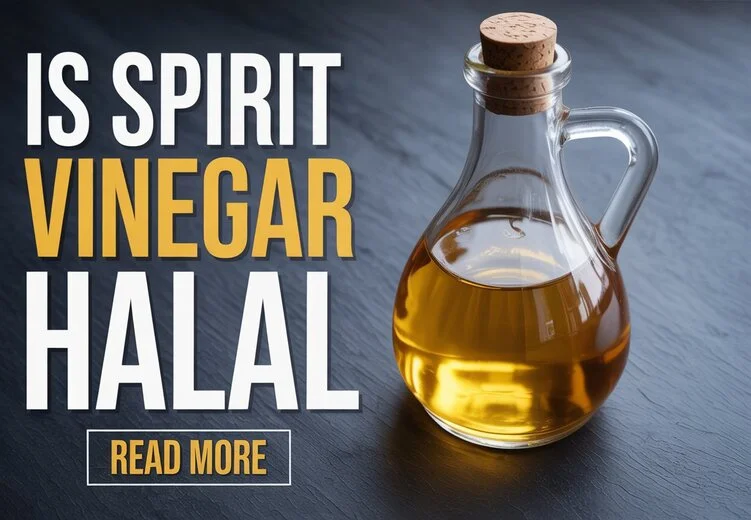Is Spirit Vinegar Halal? A Complete Guide for Muslims

Spirit vinegar is used in many kitchens around the world, but some Muslims question whether is Spirit vinegar halal. This vinegar is made from the fermentation of alcohol, which can cause concern about its permissibility in Islam. According to the Hanafi school of thought and many scholars, spirit vinegar is halal because the alcohol transforms completely into acetic acid during production.
The process of transformation, known as istihalah, changes the original substance into something new and pure. This means the vinegar no longer contains the harmful or forbidden elements of alcohol. However, some scholars recommend consulting with halal certification bodies to confirm the status of specific products.
Understanding the debate around spirit vinegar helps Muslims make informed choices. Whether it’s used in cooking or pickling, knowing its halal status ensures confidence in what is consumed.
Is Spirit Vinegar Halal?
Spirit vinegar is made by fermenting alcohol, which raises questions about its permissibility in Islam. The issue mainly depends on how Islamic rules view the source and transformation of alcohol during vinegar production. The answers are guided by Islamic law principles, scholarly interpretations, and the chemical changes involved.
Core Principles of Halal in Islam
Halal dietary rules focus on what is permissible for Muslims to consume. Alcohol is generally forbidden because it is intoxicating. However, halal status is not only about ingredients but also about their transformation. When a forbidden substance changes completely into something else without intoxicating effects, it may become halal.
Vinegar is one such product derived through fermentation. It involves converting alcohol into acetic acid, which does not intoxicate. Islamic law calls this process istihalah (transformation), which is a key principle for deciding if a product like spirit vinegar is halal.
Islamic Scholar Opinions on Spirit Vinegar
Many Islamic scholars agree that spirit vinegar is halal based on it undergoing complete transformation. According to the Ḥanafī school of thought and others, if alcohol changes into vinegar, it loses its original forbidden status.
Some scholars cite Prophet Muhammad’s words approving vinegar as permissible. They note that vinegar made from wine or spirits is allowed because the final product is no longer wine but vinegar. However, some scholars recommend verifying halal certification to be certain about processes and purity.

Alcohol Content and Transformation
Spirit vinegar starts from distilled alcohol produced from grains like barley or maize. During fermentation, this alcohol turns into acetic acid through natural bacterial action. This process eliminates the intoxicating effects of alcohol.
The acetic acid concentration in spirit vinegar is typically about 5-8%, a non-alcoholic substance unlike the original spirit. Because of this full chemical change, spirit vinegar is considered halal by most scholars, as there is no remaining alcohol content that can cause intoxication. Exceptions or doubts can be resolved by consulting halal certifying bodies. For more detailed Islamic perspectives, see spirit vinegar halal discussions at Islamic Portal.
Spirit Vinegar Production and Ingredients
Spirit vinegar is made through a process that changes alcohol into acid, using certain raw materials that matter for its halal status. Understanding how fermentation works, what ingredients are used, and the role of acetic acid is key to knowing if it aligns with dietary guidelines.
Fermentation Process Overview
Spirit vinegar begins with an alcoholic liquid, often distilled from grains or sugar sources. During fermentation, special bacteria convert the alcohol into acetic acid. This process removes the intoxicating properties of the original alcohol.
Fermentation involves two main steps: first, alcoholic fermentation by yeast turns sugars into alcohol. Then, acetic acid bacteria oxidize this alcohol into vinegar. This complete chemical transformation changes the substance’s nature.
The transformation stage is important because it affects whether spirit vinegar is considered halal or haram by Islamic scholars, as the intoxicating element is removed.
Base Ingredients and Their Halal Status
The base ingredients for spirit vinegar usually come from fermented cereals like barley, maize, or sugar cane. The raw materials themselves are halal if not contaminated with any prohibited substances.
Alcohol in the production is from these raw materials but is turned into vinegar through fermentation. It is essential that the starting alcohol is free of impurities considered haram.
Some versions use chemically produced acetic acid instead of natural fermentation. These chemical processes do not involve alcohol and are often regarded as halal by default, provided no haram substances enter the process.
Role of Acetic Acid in Vinegar
Acetic acid is the main component that gives spirit vinegar its sour taste and preserves it. It results from the oxidation of alcohol during fermentation.
Because acetic acid is no longer intoxicating, many scholars say spirit vinegar is halal due to this change. This concept is known as istihalah or complete transformation.
The presence of acetic acid means the original alcohol has fully converted into a new, non alcoholic chemical, which affects the permissibility of using spirit vinegar in foods.
Types of Vinegar and Halal Alternatives
Vinegars come in many forms, each made from different base ingredients. The halal status depends on the source and production method. Some vinegars are clearly accepted, while others, like spirit vinegar, require more careful consideration. Alternatives like apple cider and balsamic vinegar offer trustworthy options for halal diets.
Comparison with Apple Cider Vinegar
Apple cider vinegar is made from fermented apple juice. It contains no alcohol by the time it is ready to use, making it widely accepted as halal. Its natural fruit base and fermentation process are straightforward. Apple cider vinegar is often recommended for those who want halal certified options with similar uses to spirit vinegar.

Unlike spirit vinegar, which is derived from distilled alcohol, apple cider vinegar begins with fruit, avoiding the concerns linked to alcohol sources. It can be used safely in cooking, pickling, and dressings without any halal doubts.
Balsamic Vinegar and Its Halal Status
Balsamic vinegar comes from fermented grape juice, specifically Trebbiano grapes. Unlike wine vinegar, the grapes are crushed and aged but usually do not retain alcohol. If properly made, balsamic vinegar is generally considered halal by many scholars due to the absence of residual alcohol.
However, some types of balsamic vinegar blend additional ingredients or alcohol during aging. Checking for halal certification or ingredients is important for those concerned about purity. Balsamic vinegar offers a rich flavor that works well in dressings and sauces.
Differences from Wine Vinegar
Wine vinegar is made by fermenting actual wine, which originates from fermented grapes and contains alcohol. The fermentation process turns the wine into vinegar by converting alcohol into acetic acid. Some scholars allow wine vinegar if the transformation is natural and complete, making it free from intoxicants.
Others argue that wine vinegar is not halal if the starting product is wine made for drinking. This creates disagreement in halal rulings. Thus, many avoid wine vinegar or look for halal certification to ensure it aligns with dietary rules.
Other Vinegar Options
Other vinegar types include rice vinegar, white distilled vinegar, and fruit-based vinegars. Rice vinegar, made from fermented rice, is usually halal and popular in Asian cuisine. White distilled vinegar comes from fermented grain alcohol but is often considered halal if the alcohol is fully converted.
Fruit vinegars come from juices like berries or pears and share the same halal status as apple cider vinegar. These alternatives avoid the alcohol concerns tied to spirit and wine vinegar, making them reliable choices for halal cooking and baking.
Usage, Misconceptions, and Practical Considerations
Spirit vinegar is widely used in cooking and cleaning, but its halal status leads to some confusion. Understanding how it is made and consumed helps clarify the proper use for those following Islamic dietary rules.
Common Uses of Spirit Vinegar for Muslims
Spirit vinegar is often used for pickling, flavoring dishes, and as a preservative. It is also popular in household cleaning due to its strong acidity.
Muslims who follow halal rules often choose spirit vinegar because it lacks the intoxicating properties of alcohol. It is commonly found in marinades, salad dressings, and sauces. Many halal certified food products use spirit vinegar as a safe acidic agent.

Despite concerns, the presence of transformed alcohol in spirit vinegar means it is generally suitable for use in food and drink. However, people should check for halal certification when possible, especially in processed foods that include spirit vinegar.
Misconceptions About Spirit Vinegar Halal
One common misconception is that spirit vinegar contains alcohol in an untransformed, intoxicating form. In fact, alcohol used to make spirit vinegar fully converts into acetic acid during fermentation.
Another misunderstanding is that all vinegar made from wine or alcoholic sources is haram. This is not always true because Islam allows vinegar if the alcohol turns into vinegar and loses its intoxicating effect.
Some believe vinegar from certain sources is prohibited regardless of fermentation. However, according to the Hanafi school and many scholars, the transformation process makes spirit vinegar halal. Conflicting views exist, but most agree on its permissibility once alcohol changes into acid.
Key Conditions for Halal Compliance
For spirit vinegar to be halal, the alcohol must be completely converted into vinegar. This process is called “istiḥālah,” which removes the original alcohol’s unlawful status.
The vinegar should not contain added alcohol or anything that reintroduces intoxication. It must also be free from impurities or haram substances during production.
Proper halal certification or approval from trusted Islamic scholars helps confirm compliance. Muslims are advised to consult qualified halal bodies when in doubt about specific brands or products.
Checking that spirit vinegar is used as a vinegar and not as an alcoholic ingredient aligns with halal dietary guidelines found in various Islamic rulings.
Conclusion
Spirit vinegar’s halal status depends on its ingredients, the chemical changes during production, and Islamic legal opinions. The understanding of its permissibility varies by Islamic school of thought and by the standards used for halal certification in different countries.
